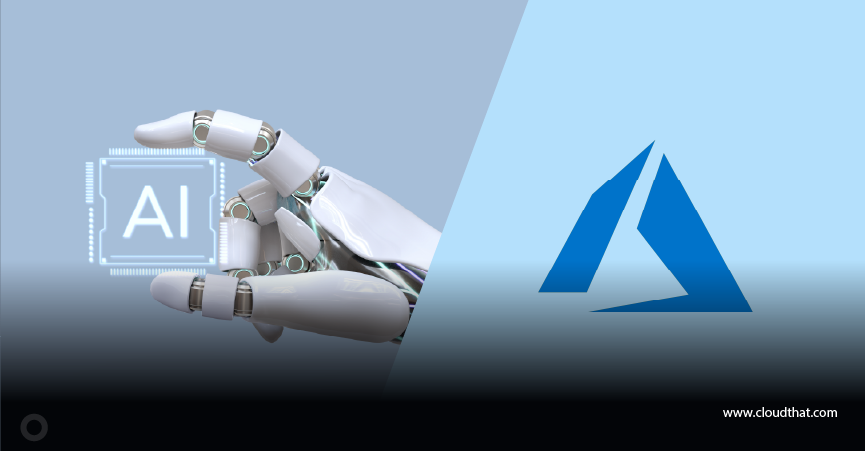|
Voiced by Amazon Polly |
Overview
Microsoft has officially launched the Azure AI Foundry portal, a cutting-edge workspace designed to accelerate the development of agentic and generative AI solutions. Now integrated into the AI-102: Designing and Implementing an Azure AI Solution course, this portal empowers learners to move beyond theory and into hands-on, enterprise-grade AI innovation.
Whether you’re building intelligent agents, fine-tuning models, or deploying AI at scale, the Foundry portal offers a unified, secure, and collaborative environment to make it happen.
Start Learning In-Demand Tech Skills with Expert-Led Training
- Industry-Authorized Curriculum
- Expert-led Training
Introduction to Azure AI Foundry
What sets it apart is its focus on multi-agent orchestration, model interoperability, and responsible AI governance. Foundry isn’t just for experimentation—it’s built for production.
Key highlights:
- Supports agent-based architectures with built-in tracing and evaluation
- Enables cross-model development with a unified API layer
- Offers prebuilt templates for rapid prototyping across industries
Key Features and Architecture
The Foundry portal is designed with modularity, governance, and developer productivity in mind. Here’s a deeper look:
Foundry Projects: These are secure, collaborative workspaces with shared storage, thread history, and semantic search. Perfect for cross-functional teams working on AI agents. Foundry Projects are secure, collaborative workspaces where developers, data scientists, and business analysts can co-create AI agents and applications.
- Each project is a child resource under a Foundry hub, inheriting governance policies while allowing independent experimentation.
- Includes shared storage, thread history, and semantic search, enabling teams to track agent conversations, retrieve relevant documents, and iterate quickly.
- Supports bring-your-own Azure resources, allowing organizations to align with internal compliance and cost management strategies.
- Designed to reduce IT bottlenecks—once governance is set at the hub level, developers can self-serve confidently within their projects
Unified Resource Provider: The Unified Resource Provider simplifies infrastructure management by consolidating all Azure services under a single namespace.
- Manages compute, networking, RBAC (Role-Based Access Control), and policy enforcement centrally, reducing fragmentation across services.
- Enables consistent governance across agents, models, and data pipelines—critical for regulated industries like healthcare and finance.
- Supports customizable enterprise configurations, including private endpoints, virtual networks, and Microsoft Defender integration.
- This unified model ensures that AI development aligns with broader cloud security and compliance frameworks, making it easier for IT teams to monitor and audit.
Model-Agnostic API Layer: Developers can interact with models from OpenAI, Hugging Face, Meta, and Mistral using a consistent API contract, reducing integration overhead. One of Foundry’s most powerful features is its model-agnostic API layer, which abstracts away the complexity of working with multiple model providers.
- Developers can interact with models from OpenAI (GPT-4, GPT-4o, GPT-5), Hugging Face, Meta, and Mistral using a consistent API contract.
- This reduces integration overhead and allows teams to swap or compare models without rewriting application logic.
- Supports fine-tuning and evaluation workflows, enabling domain-specific customization while maintaining interoperability.
- Ideal for organizations experimenting with multi-model strategies or seeking fallback options for cost, latency, or licensing reasons.
SDKs & VS Code Extension: Available in Python, C#, JavaScript/TypeScript, and Java (preview). The VS Code extension streamlines agent development with built-in debugging and tracing tools.
Azure AI Foundry offers robust developer tooling to accelerate agent development and debugging.
- SDKs are available for Python, C#, JavaScript/TypeScript, and Java (preview)—making it accessible across full-stack teams.
- The VS Code extension includes:
- Agent tracing and monitoring tools
- Integrated model catalog browsing
- Semantic search and grounding configuration
- Debugging workflows for multi-agent orchestration
- These tools enable rapid prototyping, real-time testing, and seamless deployment, all within the developer’s preferred environment
MLOps Integration: Native support for CI/CD pipelines via GitHub and Azure DevOps. Automate model training, testing, deployment, and monitoring with ease.
Foundry is built with production-readiness in mind, offering native support for CI/CD pipelines and model lifecycle automation.
- Integrates with GitHub Actions and Azure DevOps, allowing teams to automate:
- Model training and retraining
- Evaluation and performance monitoring
- Deployment to staging and production environments
- Supports versioning, rollback, and audit trails, which are essential for enterprise-grade AI governance.
- Enables continuous improvement loops, where feedback from deployed agents can trigger retraining or prompt engineering updates.
Edge AI Support: Deploy models to cloud, on-prem, or edge environments. Ideal for scenarios with low connectivity or real-time inference needs.
Foundry supports hybrid and edge deployments, making it ideal for scenarios where latency, connectivity, or data sovereignty are critical.
- Models can be deployed to cloud, on-premises, or edge devices, using containerized runtimes and lightweight inference engines.
- Supports real-time decision-making in environments like manufacturing floors, autonomous vehicles, and remote healthcare setups.
- Enables data minimization and privacy compliance by keeping sensitive data local while still leveraging powerful AI capabilities.
- This flexibility ensures that AI solutions can be tailored to operational constraints without sacrificing performance or security
Why It Matters for AI-102 Learners
The AI-102 course now includes hands-on labs and guided scenarios using Azure AI Foundry. CloudThat’s training program for AI-102 now includes hands-on labs and guided scenarios built around Azure AI Foundry—shifting the emphasis from conceptual learning to applied, production-grade development.This marks a shift from conceptual learning to practical, production-grade AI development.
Learners benefit by:
- Building real-world solutions using prebuilt templates and SDKs
- Understanding how to operationalize AI responsibly across industries
- Gaining exposure to multi-agent design patterns and orchestration workflows
- Learning how to integrate AI into existing enterprise systems with minimal friction
This addition transforms AI-102 into a launchpad for enterprise-ready AI architects, not just developers.
Real-World Use Cases Across Industries
Azure AI Foundry is already being adopted across sectors for high-impact use cases:
| Industry | Use Case Example |
| Healthcare | Automate clinical document processing, extract insights from EHRs, and assist in diagnosis workflows using multi-agent systems. |
| FinTech | Build fraud detection agents, automate compliance checks, and enhance customer support with conversational AI. |
| Insurance | Summarize lengthy contracts, streamline underwriting, and deploy intelligent chatbots for claims processing. |
| Automotive | Enable in-car AI assistants, optimize navigation with real-time data, and support predictive maintenance at the edge. |
| Consulting | Automate knowledge retrieval, generate client-ready reports, and streamline internal workflows using agentic AI. |
These use cases demonstrate the portal’s versatility—from document intelligence to conversational agents and predictive analytics.
Let’s Conclude by Hearing a Customer Story
H&R Block, a global tax advisory firm, recently adopted Azure AI Foundry to build a multi-agent system that automates client onboarding and document summarization. Using the portal’s prebuilt templates and semantic search capabilities, their team developed agents that could:
- Retrieve relevant tax documents from client uploads
- Summarize key financial data
- Generate personalized advisory recommendations
The result? A 50% reduction in onboarding time and a significant boost in client satisfaction.
“Azure AI Foundry helped us move from siloed automation to intelligent orchestration. It’s not just faster—it’s smarter.” — Lead AI Architect, H&R Block
VOLVO, a global automotive leader, adopted Azure AI Foundry to automate document processing across its supply chain. Using the portal’s prebuilt templates and semantic search capabilities, VOLVO built agents that could:
- Extract structured data from invoices and contracts
- Summarize key terms and flag anomalies
- Integrate insights into their ERP system for faster decision-making
The result? A 60% reduction in manual processing time and improved operational transparency.
“Azure AI Foundry helped us scale AI across departments without compromising on governance or speed. It’s the future of enterprise AI.” — Head of Digital Transformation, VOLVO
Conclusion and Next Steps
The Azure AI Foundry portal is a strategic leap forward in how organizations build, deploy, and scale AI solutions. Its integration into the AI-102 course signals Microsoft’s commitment to empowering learners with real-world, responsible AI skills.
Whether you’re training teams, designing curriculum, or building enterprise-grade applications, Foundry offers the tools, templates, and governance needed to succeed.
As organizations accelerate their adoption of GenAI and cloud-native technologies, the need for strategic guidance, hands-on training, and ethical implementation becomes paramount. Whether you’re designing scenario-driven learning programs or building agentic AI solutions, success hinges on clarity, adaptability, and real-world relevance.
This is where partners like CloudThat (CloudThat Marks 13 Years of Cloud Excellence – A Milestone of Innovation and Growth – CloudThat Resources) a transformative role. With their deep expertise in cloud consulting, AI/ML enablement, and industry-aligned training, CloudThat empowers teams to not only upskill but also operationalize innovation responsibly. Their commitment to practical learning and scalable solutions makes them a valuable ally for enterprises navigating the future of technology.
By combining thoughtful design with trusted partnerships, we can build ecosystems that are not just intelligent—but inclusive, ethical, and impactful.
Upskill Your Teams with Enterprise-Ready Tech Training Programs
- Team-wide Customizable Programs
- Measurable Business Outcomes
About CloudThat
CloudThat is an award-winning company and the first in India to offer cloud training and consulting services worldwide. As a Microsoft Solutions Partner, AWS Advanced Tier Training Partner, and Google Cloud Platform Partner, CloudThat has empowered over 850,000 professionals through 600+ cloud certifications winning global recognition for its training excellence including 20 MCT Trainers in Microsoft’s Global Top 100 and an impressive 12 awards in the last 8 years. CloudThat specializes in Cloud Migration, Data Platforms, DevOps, IoT, and cutting-edge technologies like Gen AI & AI/ML. It has delivered over 500 consulting projects for 250+ organizations in 30+ countries as it continues to empower professionals and enterprises to thrive in the digital-first world.
WRITTEN BY Sushravya B.K


 Login
Login


 September 16, 2025
September 16, 2025 PREV
PREV











Comments